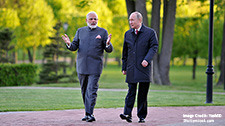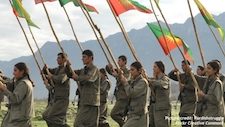Brussels, Moscow and energy security – a struggle on equal terms?
Boris Ajeganov
Despite an economic downturn, Moscow is increasingly trying to re-position itself as a global actor by attempting to control its neighbors and weaken Europe. In part, it aims to achieve its foreign policy goals towards both the EU and the former Soviet Union (FSU) states through the instrumentalization and, arguably, weaponization of energy projects. By pitching hydrocarbons transportation projects to individual EU member states, Russia seeks to undermine both the union’s CSFP and the nascent Energy Union so it can thwart EU and transit states’ efforts to diversify away from political and economic dependence on Russian natural gas. However lucrative for local elites, Russia’s pipeline plans in the Black Sea region and Southern Europe should not be treated as legitimate business initiatives proposals, but as political manoeuvring. In addition, Moscow seems to increasingly attempting to force the EU’s hand on the energy issue by sowing instability in the South Caucasus and Central Asia. It does so in order to undercut supply to – or acquire leverage over – energy projects which it does not control or believes it will not benefit from itself. Ultimately, the EU today competes for access to hydrocarbons on Russia’s terms. If Brussels wants to compete on a level playing field, it must involve itself much more resolutely in the security arrangements of its partner states in both the South Caucasus and Central Asia.
Related Publications
-
The Limitations of India and Russia’s Transactional Relationship
Since Russia’s unprovoked invasion of Ukraine in February 2022, it might seem as though ties between India and Russia have strengthened. While much of the West isolated Russia, India-Russia energy […]
-
ISDP Annual Report 2023
ISDP’s Annual Report for the year 2023. We look back on 2023, a year in which tensions and conflicts captured the strategic space in ISDP’s focus areas, making headlines around […]
-
China in Eurasia: Revisiting BRI amidst the Russia-Ukraine Crisis
This paper discusses China’s trade and connectivity plans under the Belt and Road Initiative (BRI) in the Eurasian region and the impact of the Russian invasion of Ukraine on Chinese […]
-
Promise And Peril In The Caucasus
America’s national security bureaucracy separates the Caucasus and the Middle East into different bureaus, with Central Asia in yet another office. This is part of the reason the U.S. has […]
-
Turkey’s Problem Isn’t Sweden. It’s the United States.
The issue isn’t what Sweden says or does but what the United States does or fails to do on the ground in Syria that matters for Turkey’s national security interests. […]




